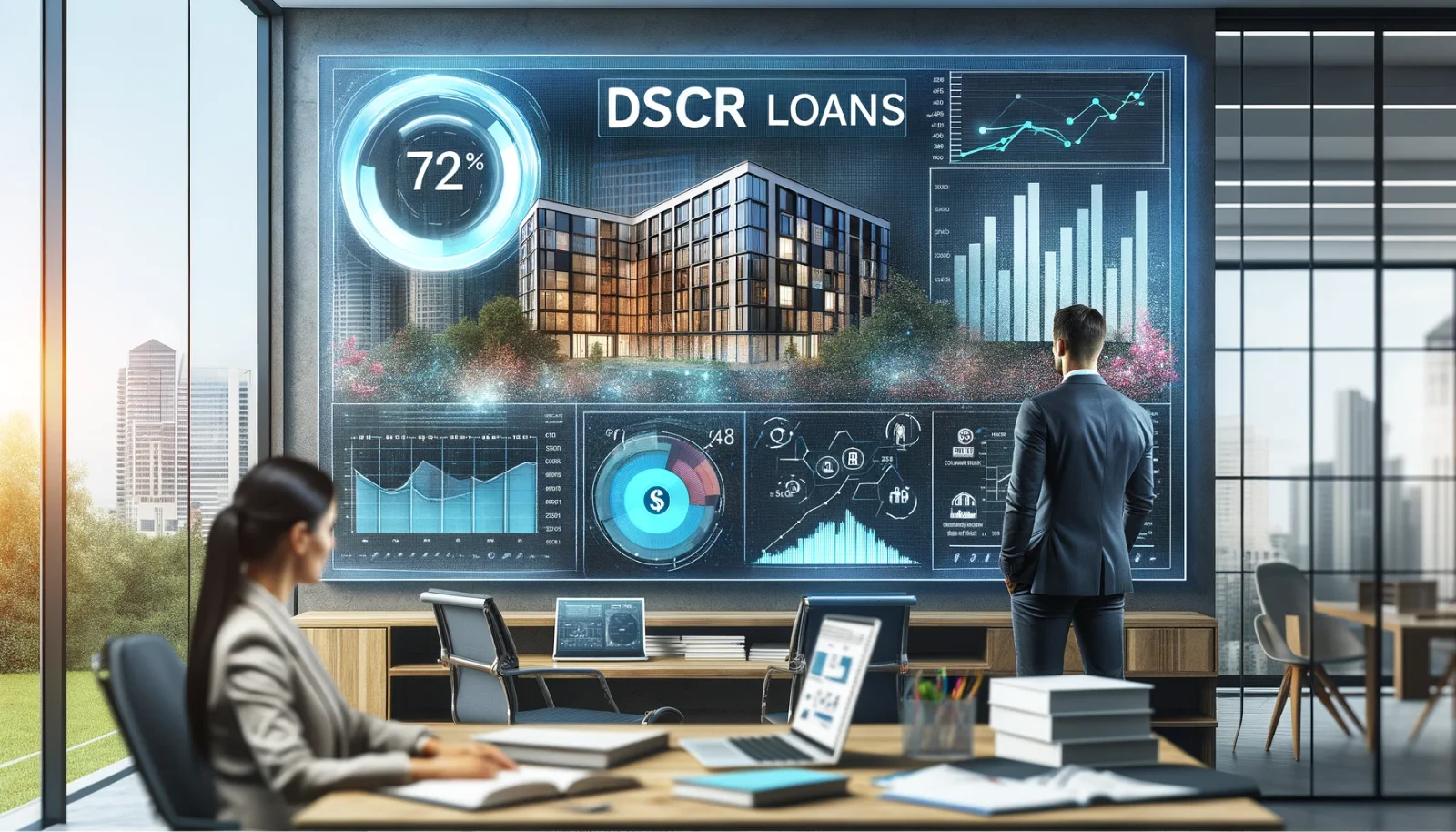In investment real estate financing, the Debt Service Coverage Ratio (DSCR) loan, also knows as an Investor Cash Flow Loan, has become an increasingly popular option for investors and property owners. The DSCR loan program is designed to help both new and seasoned real estate investors by focusing on property cash flow for qualification. DSCR loans offer a flexible and efficient financing option tailored specifically for real estate investors.

A DSCR loan is a type of investment real estate loan that relies on the property's cash flow to qualify for financing rather than the borrower's personal income. The DSCR is a financial ratio that measures a property's ability to generate enough income to cover its debt obligations. It is calculated by dividing the property's annual net operating income (NOI) by its annual debt service (loan payments).
DSCR = Annual Gross Rental Income / Annual Debt Service
Lenders typically require a minimum DSCR of 1.00, meaning the property must generate at least as much income as its annual debt service. A DSCR of 1.0 indicates that the property generates enough income to cover its debt obligations. A ratio above 1.0 signifies that the property generates surplus income, providing a cushion for the borrower. Conversely, a DSCR below 1.0 suggests that the property does not generate enough income to cover its debt obligations, posing a higher risk to the lender.
To qualify for a DSCR loan, a property must meet certain criteria:
Underwriting requirements for debt service coverage ratio loans are designed to assess the borrower’s ability to service the debt using the revenue generated by the property’s rental units. The underwriting process typically involves evaluating the property’s net operating income (NOI), debt service and creditworthiness of the borrower. Our DSCR loans can go down to a 620 credit score. Lenders may also consider the property’s location, age, and condition, as well as the borrower’s experience in managing rental properties.
DSCR loans are available for a variety of property types, making them a versatile financing option for real estate investors. Eligible properties include:
However, some property types may be ineligible for DSCR loans, such as: modular homes, mobile homes, raw land and log homes
DSCR loans cater to a wide range of borrower types, providing flexibility for different investment strategies. Eligible borrowers include:
Borrowers may be required to provide personal guarantees. Additionally, borrowers might need to meet certain reserve or liquidity requirements to qualify.
To determine if your property qualifies for a DSCR loan, you'll need to calculate its DSCR. Here's a step-by-step guide:
In cases where the DSCR is below 1.00 the property may experience negative cash flow, but investors might still consider it due to potential long-term appreciation and rental income increases.
The application process for DSCR loans involves several key steps:
The loan approval process for DSCR loans focuses on the property’s income rather than the borrower’s personal finances making loan approval easier.
DSCR loans come with specific terms and conditions, including:
DSCR loans also allow for immediate cash-out refinance upon completion of property renovations making them advantageous for investors using the BRRRR method.
Interest rates for DSCR loans can vary based on several factors including the lender, loan terms and the borrower’s creditworthiness. Generally, DSCR loans offer competitive interest rates compared to traditional mortgage loans, making them an attractive option for real estate investors. Borrowers can expect interest rates to range from 6% to 8% depending on the specifics of the loan and the lender’s criteria. For a custom rate quote, please contact us.
Prepayment penalties are fees that lenders may charge if a borrower pays off their loan before the end of the loan term. These penalties are designed to compensate lenders for the interest they would have earned had the loan been paid off according to the original schedule. DSCR loans may include prepayment penalties, but the specifics can vary widely depending on the lender and the loan terms. Some lenders offer options with no prepayment penalties while others may have penalties for 1, 2, 3 or 5 years. It’s essential for borrowers to carefully review the loan terms and conditions to understand any potential prepayment penalties before applying for the loan.

DSCR loans offer several benefits to borrowers and investors:
DSCR Loans have some drawbacks to consider:
When seeking a DSCR loan for your real estate investment, it's crucial to choose the right lender. Here are some factors to consider:
At Alpine Mortgage, we pride ourselves on being a top choice for DSCR loans. Our experienced team of investment real estate financing experts is dedicated to helping investors like you find the right loan solutions for your unique needs. We offer competitive rates, flexible terms, and exceptional customer service, making us the ideal partner for your DSCR loan needs.
DSCR loans offer a powerful financing tool for real estate investors looking to expand their portfolios and maximize their returns. By focusing on the property's cash flow rather than the borrower's personal financials, DSCR loans can provide easier qualification, higher leverage, and faster closing times. As with any financial decision, it's essential to work with a trusted lending partner who can help you navigate the process and find the best solution for your investment goals.
Whether you're a seasoned investor or just starting out, our team is here to help you unlock the power of DSCR loans and achieve your financial objectives. Contact us today to learn more about how we can help you grow your portfolio and reach new heights in your investment journey.
Call us today at (800) 876-5626 to speak with one of our DSCR loan specialists or click here to have one of our DSCR loan specialists contact you.
If you are interested in applying for a DSCR loan, you can apply online now.
The interest rate for DSCR depends on the type of property, the amount of the down payment and the loan term. For a customized DSCR loan rate quote, please contact us.
Yes, a 30 year fixed loan term is the most common for our DSCR loans.
The 1% rule states that a property should rent for at least 1% of its total upfront cost each month to be considered a good investment. This cost includes the purchase price plus any initial repairs or renovations needed to make the property rentable.For example: If you purchase a property for $100,000 and spend an additional $20,000 on renovations, the total cost is $120,000. According to the 1% rule, the property should rent for at least $1,200 per month. This rule helps investors quickly determine whether a property can generate enough rental income to justify its cost and cover expenses like mortgage payments, property taxes, insurance, and maintenance.
The most profitable rental properties are typically those located in high-demand areas such as city centers, near major employment hubs, universities, or tourist attractions. Multi-family residences like apartment buildings often offer higher profitability due to their ability to generate multiple streams of rental income from a single property. Additionally, properties in areas with strong population growth, stable or increasing job markets, and potential for property appreciation tend to be more profitable. Short-term rental properties in popular vacation destinations can also yield high returns, especially when managed efficiently and marketed well.
Yes, our DSCR loans can go down to a 620 credit score.
No, qualifying for a DSCR loan is easier than traditional loans because it focuses on the cash flow of the investment property rather than your personal income. However, lenders will review factors such as your credit score.
The down payment requirement for a DSCR loan typically ranges from 20% to 25%, depending on the lender and the specifics of the property.
Yes, our DSCR loans allow you to close in an LLC, making it a popular option for real estate investors who prefer to hold properties under a business entity.
Yes, DSCR loans can be used for short-term rental properties, as long as the property generates sufficient income to meet the lender's DSCR requirements.
Yes, DSCR loans are designed for investment properties and are not intended for owner-occupied residences.